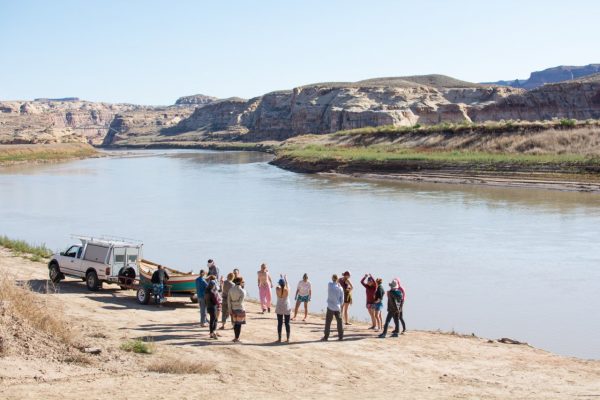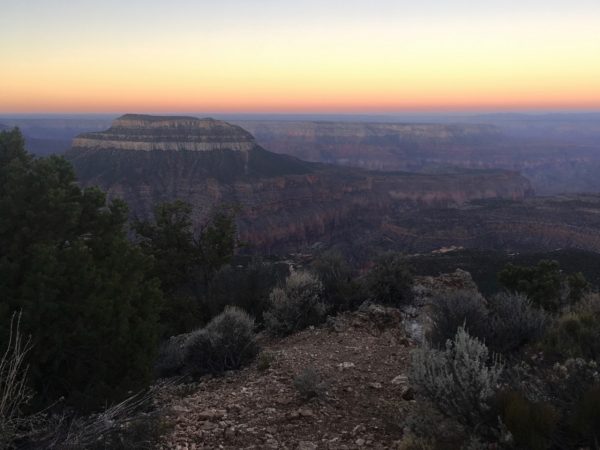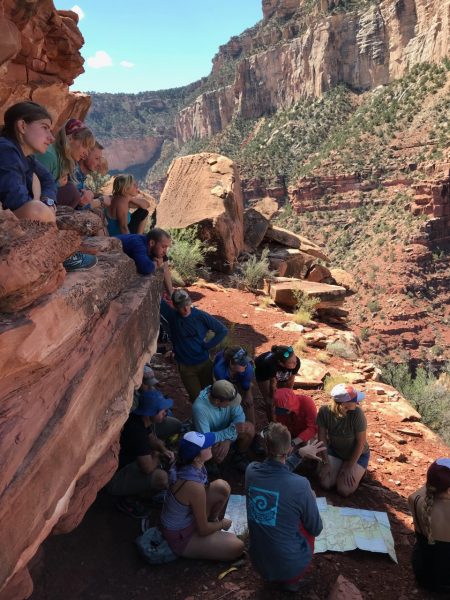EcoLeague Takes Dickinson’s Katie Overstrum from Carlisle to the Colorado River
Katie Overstrum recently returned to Dickinson College from a Fall 2018 exchange to Prescott College, where she took part in the college’s distinctively immersive “Grand Canyon Semester“. Here, Katie shares how she first heard about EcoLeague during her freshman year, her experiences while spending two weeks in the field, and her possible future plans in research.
How did you get involved with EcoLeague?

Participants in the Grand Canyon Semester gather by the riverside.
I’d heard of the EcoLeague when I applied to Dickinson, so when there was an info session freshman year, I decided to check it out. There were two EcoLeague alums there, and they LOVED it. From then on, I knew that it was something I wanted to do, I just had to decide which school I wanted to go to and when would work best.
Why did you choose to study at Prescott?
I chose Prescott particularly for the field semester called “A Grand Canyon Semester.” And it was INCREDIBLE. All 16 of us took the same suite of 4 classes, allowing us to travel around the entire Grand Canyon region as we did so, by van, foot, and boat.
What kinds of academic work or research did you do on exchange?
My field semester consisted of four courses–Expeditionary Travel for Rivers and Canyons; Landscape Ecology; Cultural Geography of the Grand Canyon; and Teaching, Research, and Resource Stewardship on Public Lands. So, I did lots of different work across different disciplines, from learning to row an 18 foot oar rig on the Colorado River to writing and presenting in a research symposium on the distribution of Ponderosa Pine across the Southern Colorado Plateau.

A sunrise stretches over the Grand Canyon.
What was being in the natural environment at Prescott like compared to Dickinson?
I’ve spent a lot of time at Dickinson in the classroom learning. Labs have been a great chance to get outside and experience things, but they only last 3 hours. At Prescott, we would sometimes spend over two weeks in the field! This gave me the chance to learn through experience on a day-to-day basis, instead of just two or three times a week. It also meant that learning didn’t stop when the school day was over. Having peers and professors on hand 24/7 meant that we could ID plants early in the morning or discuss the rock layers of the Grand Canyon over dinner.

A snapshot of one of the many outdoor “classrooms” Katie Overstrum learned in over the course of her semester in the Grand Canyon.
Have your EcoLeague experiences helped you prepare for your current academic or other work? How so? Any future plans?
Participating in the EcoLeague helped to round out my academic experiences in college. I had the chance to apply my Environmental Science studies in a new ecosystem, as well as an opportunity to do research with a local ecologist in Flagstaff. Though I still don’t know what I want to do, I’ve been thinking about working in education or research after college, so this program was definitely helpful, especially the course “Teaching, Research, and Resource Stewardship on Public Lands.”
What advice do you have for other students interested in EcoLeague?
If you’re considering the EcoLeague, I’d really recommend a field course or semester. Time in the field gives you a special connection to your classmates, as well as an incredible chance to experience the things you’re learning about and the place you’re studying in.